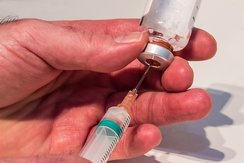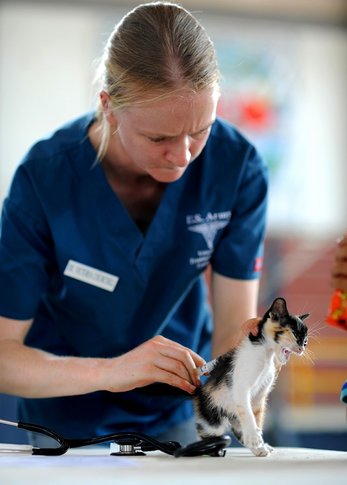|
by Dr. S. Dawn Dinger, DVM  Vaccinations are one of the best ways to help keep your pet healthy and living a long and happy life. There are many different vaccines that protect against a multitude of different diseases which can affect both your pet and you. Recently though there have been some questions about how often to vaccinate and even what vaccines to give. In part I of this this blog, we'll answer some of the common questions about vaccinations. In parts II and III we'll cover the most current vaccine recommendations for both dogs and cats and talk about what diseases they protect against.  What is a vaccine? Vaccines are substances given to stimulate the immune system. They are usually given by injection, but there are some oral (by mouth) and intranasal (by nostril) vaccines as well. Vaccines contain “antigens” which are designed to look like the disease they are protecting against and which stimulate the production of “antibodies” - small proteins which fight specific infections. This way, if the dog or cat is ever exposed to the real disease, their body is already prepared to fight off the infection. I've heard about core and non-core vaccines. What does that mean? These are terms used by the latest American Animal Hospital Association (AAHA) and American Association of Feline Practitioners (AAFP) vaccination guidelines. In general, “core” vaccinations are those that are considered vital for every pet due to how common the disease is, the risk of exposure, the severity of the disease or the risk to people. These include diseases such as Distemper and Parvo virus for dogs; Panleukopenia and Rhinotracheitis for cats; and Rabies for both species. “Non-core” vaccines are ones that your pet may or may not need depending on their lifestyle and risk of exposure. This does not necessarily mean that the diseases are less severe. Non-core vaccines include diseases such as Bordetella (Kennel Cough) and Feline Leukemia. At Green Valley Veterinary Hospital we will discuss vaccinations for your pet at each wellness visit to help determine what is needed to keep your pet safe.  Are any vaccinations required by law? Typically rabies vaccinations are required by law for dogs and cats over 12 weeks of age in the United States, however individual states may have different requirements as to how often those vaccinations need to be given (IE every year vs every 3 years). How often does my puppy or kitten need to be vaccinated and when do we start? Puppies and kittens receive some antibodies from their mother while nursing (assuming she was properly vaccinated herself). These help protect them from disease while they are very young, however the strength of those antibodies wanes with time. To compensate for this and the fact that young animal's immune systems are still maturing, vaccinations are typically started around 6-8 weeks of age and are continued every 3-4 weeks until they are 16-20 weeks of age. What about my adult dog or cat? The vaccination schedule for adult animals depends on the type of vaccine given, the disease we are protecting against, your pet's overall health and previous vaccination history. Some vaccines may need to be given annually, while others might only need to be given every three years. We will work with you to determine the best vaccination schedule for your pet. Are there any risks? Countless animals have been saved by vaccination so the benefits definitely outweigh the risks. However as with any medical procedure, there is always a small chance of side effects. With the vaccinations available today however, in most cases these risks are quite small compared to the disease itself.  What signs should I watch for? Vaccines stimulate the immune system. It is not uncommon for there to be some mild soreness at the site where the vaccine was given (just like us when we get a vaccine), but a low grade fever or even allergic reactions can develop less commonly. Some signs that warrant veterinary attention include: severe lethargy, vomiting, diarrhea, facial swelling, hives, pallor (looking pale in hairless areas or gums) and collapse. What are Vaccine Associated Sarcomas in cats? A sarcoma is a type of cancer. Most sarcomas that occur are not related to vaccines at all, but some tumors have occurred at the site of vaccinations with Rabies and Feline Leukemia being the most commonly implicated. Most veterinary scientists believe the culprit is the “adjuvant” in those vaccinations (an adjuvant is a substance that is added to some vaccines to stimulate a stronger immune response and prolong the vaccine's action) and so current recommendations are to only administer “non-adjuvanted” vaccines to cats. Rest assured that at Green Valley Veterinary Hospital we only administer the safest vaccinations available to our feline patients. Fortunately vaccine associated sarcomas are quite rare, only occurring between 1 in 1000 to 1 in 10,000 vaccinations. Can I buy and administer vaccinations at home for my pet? The short answer to this question is yes (except for Rabies which by law has to be administered by a licensed veterinarian), but it is not recommended for several reasons. One, vaccines need to be shipped and stored at the proper temperature to maintain their sterility and effectiveness. This can not be guaranteed when purchasing vaccines at the pet or feed store for example. Also vaccinations need to be administered appropriately and in the locations recommended in the current guidelines which can sometimes be difficult without appropriate training and restraint. In addition, syringes and needles are considered medical waste and can not be legally disposed of in the regular trash, and in the event that your pet does develop a problem secondary to the vaccination, you may not be quipped to manage it. Most importantly though is the fact that there is much more to your pet's annual visit that just “shots”. A complete, comprehensive physical exam is the most important part of your pet's visit to the veterinarian, but that visit also includes assessment of and recommedations on things like behavior, diet, parasite control and diagnostic testing, as well as an assessment of risk so the correct vaccinations themselves can be selected. In Part II of this blog, we will discuss the current canine vaccination guidelines and the various disease we are trying to prevent so stay tuned….
12 Comments
11/25/2020 09:11:03 am
It's awesome that you elaborate on how vaccines can protect your pet from a range of dangerous illnesses. I want my new puppy to stay healthy, so I'm considering taking him to a veterinarian to get vaccinated this month. I'm going to see if there's a good veterinarian in my area that offers vaccinations for dogs.
Reply
1/11/2021 09:04:50 am
It's valuable that you mention that vaccines can help protect your pet from diseases. I want to make sure that my new puppy stays healthy, so I'm thinking about taking him to a pet hospital to get vaccinated soon. I'm going to look for a good pet hospital in my area that offers vaccinations for dogs.
Reply
1/28/2021 08:56:32 am
Thank you for pointing out that having your pet vaccinated for diseases can help them live longer. I want my new puppy to live for a long time, so I'm thinking about taking him to an animal hospital to get vaccinated this month. I'm going to search for a good animal hospital in my area that does vaccinations for dogs.
Reply
1/28/2021 11:13:45 am
It's great that this article expounds on the fact that vaccinations are an important part of keeping a pet healthy. I want to do everything I can to help my new puppy stay healthy, so I'm contemplating taking him to an animal hospital soon to get vaccinated. I'm going to search for a reputable animal hospital in my area that does dog vaccinations.
Reply
1/29/2021 08:59:32 am
Thank you for elaborating on how vaccines can help protect your pet from diseases. I want to make sure that my new puppy lives for a long time, so I'm thinking about taking him to an animal hospital to get vaccinated this week. I'm going to look for a good animal hospital in my area that offers pet vaccination services.
Reply
2/3/2021 08:59:30 am
It's interesting that this article mentions that vaccines can help protect your dog from diseases. I want to make sure that the puppy that I just adopted stays healthy, so I'm considering taking him to an animal hospital soon to get vaccinated. I'm going to see if there's a reputable animal hospital in my area that offers pet vaccination services.
Reply
Rabies is a disease that is transmitted from animals to humans caused by the rabies virus. The rabies virus is mainly transmitted through an animal’s saliva when the infected animals bite or scratch someone. Can you tell me that, how long does rabies vaccine last? Thanks you reading?
Reply
11/15/2021 04:07:17 pm
It helped when you mentioned that it is important to have your pet vaccinated because it stimulates the immune system. My sister mentioned to me that she is planning to have her pet vaccinated and asked if I have any idea what is the best option to do. Thanks to this informative article and I'll be sure to tell her that she can consult a well-known veterinary service as they can answer all her inquiries and will provide good care of her pet.
Reply
11/19/2021 05:37:42 pm
It helped when you mentioned that it is important to have your pet vaccinated because it protects them from having diseases and viruses. My sister mentioned to me that she is planning to have her pet vaccinated and asked if I have any idea what is the best option to do. Thanks to this informative article and I'll be sure to tell her that she can consult a well-known animal health clinic as they can answer all her inquiries and will provide good care of her pet.
Reply
12/26/2022 05:27:07 am
Thank you so much!! I hope to see more updates from you.
Reply
5/18/2023 02:41:15 pm
Next week, my sister's adopting a dog and is currently researching how to take good care of one. I'm glad you talked about how some vaccinations are given annually or every couple of years for adult dogs, so I'll make sure that my sister's aware of this. Thanks for the tips on pet vaccinations and their importance.
Reply
Leave a Reply. |
AuthorsDr. S. Dawn Dinger, DVM Archives
May 2017
Categories |
 RSS Feed
RSS Feed